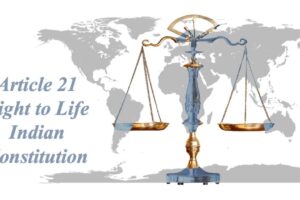
RELEVANCE OF JUDICIAL REVIEW IN INDIA
It is conceivable to make reference to the judiciary’s ability to assess and determine the constitutionality of a statute or order as a “judicial review” ability. The judicial system in India depends on the “procedure established by law” concept, which has one evaluation: if the law is drafted using legal procedures, it will be deemed void and unconstitutional.
Whenever a country has a rule of law, the laws of the land are the supreme law of India. The Indian judiciary holds the power to overturn any piece of legislation that contradicts the essential clauses of the Indian constitution, which is the supreme governing document in the nation. The term “judicial review” does not appear in the Indian Constitution, notwithstanding the fact that it is clarified in many of its chapters.
Judicial Review: About
- The idea of Judicial review encompasses the concept that governs the judiciary’s evaluation and scrutiny of activities relating to legislative and executive wing of the government. The court, through this concept, is empowered to evaluate the functioning of the other two arms of the state, even though India simultaneously maintains the idea of the separation of powers between the three wings i.e., executive, legislative, and judicial branches.
- The Indian Constitution categorically states in Article 13(2) that anything that violates a provision of the fundamental rights will be declared unconstitutional and void.
- Article 32 of the Indian Constitution gives the Supreme Court of India the authority to uphold the fundamental rights laid down in the part III of the grund norm. This empowers people to have the ability to file any direct complaint with the SC in order to seek redressal for violations of their fundamental rights which are guaranteed by the Constitution.
Judicial Review: Relevance
- Judicial review is one of the strongest pillars that helps in upholding the supremacy of our Constitution.
- The judicial review process restricts abuse of power/authority of the legislative and executive.
- Individuals’ fundamental rights are safeguarded and preserved through the means of Judicial review.
- Thisconcept beautifully guarantees the independence of the Indian Judiciary.
Judicial Review: Categories
The different categories of judicial review as discussed commonly by various RJS Coaching institutes are as follows:
- Reviews of Legislative Proceedings: This review suggests the authority to verify that laws enacted by the legislature adhere to the Constitution’s requirements.
- Reviews of Executive Proceedings: During the exercise of their authority, administrative authorities can use this weapon to enforce constitutional discipline.
- Reviews of Judiciary Decisions: Examples of this include the Golaknath case, the Minerva Mills case, the bank nationalization case, the privy purse elimination case, and others.
Judicial Review: Drawbacks
There are numerous restrictions on the judiciary’s ability to exercise its power of judicial review. Among the drawbacks of the judicial review are:
- It restricts the power of the governing body to act. It is only appropriate to define the extent to which it demonstrates if the decision and the justification behind it were made correctly.
- Once the opinions of the judges have been gathered in any case, they serve as the norm by which the cases that follow are resolved.
- It is eligible for use by higher courts, like the Supreme Court of India and the higher courts.
- Regular court involvement could damage the public’s trust in the honesty, skill, and efficiency of the management.
- Whether it is absolutely necessary or not, the judiciary has no right to become engaged in politics or policy matters.
- It may influence decisions that have either private or self-serving motives, it may be detrimental to the public as a whole.
- It is contrary to the legally enforced limit on the exercise of authority to prevail over any existing legislation.
Judicial Review: Landmark Rulings
There are major landmark rulings that are often discussed by various RJS Coaching institutes. They are as follows:
- The Supreme Court heard a challenge to the 1951 First Amendment Act in Shankari Prasad v Union of India. The challengers claimed that the Act had curtailed their “Right to Property” and that this could not be allowed under Article 13(2) of the Constitution. The Supreme Court dismissed the argument, stating that Article 368’s provisions are entirely general and provide the parliament the absolute authority to change the constitution.
- By a majority vote in the Minerva Mills case, the Supreme Court invalidated Section 4 of the 42nd Amendment Act, which gave the directive principles authority over Articles 24, 19, and 31 of our Constitution. Since it would undermine the coherence of the Constitution of India and declare that Parts III and IV are equally significant and cannot have absolute precedence over the other.Interpreting the various articles of the constitution therefore aids in the appropriate implementation of legislation throughout the nation.
According to various RJS Coaching institutes, Judicial review assures that the government as well as its agencies respect citizens’ rights and operate within the boundaries of the law. It is still an essential tool for maintaining the rule of law, defending individual rights, and encouraging accountability in government, despite its difficulties and critics. Judicial review is still relevant and strong in a democratic and multicultural nation like India, where it acts as a safeguard against oppression and injustice.



